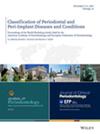Impact of smoking habit on the subgingival proteome in patients with periodontitis
Abstract
Background
Few investigations evaluated smoking's impact on the periodontal proteome. Therefore, this study aimed to analyse the influence of tobacco on the overall periodontal proteome and the differential expression of gingival crevicular fluid (GCF) proteins using sequential window acquisition of all theoretical mass spectra (SWATH-MS).
Methods
GCF samples were collected from 40 periodontitis subjects (stages III−IV). These were separated based on smoking status into smokers (17), ex-smokers (10), and non-smokers (13). Samples were analysed using SWATH-MS, and proteins were identified using the UniProt human-specific database. Data are available via ProteomeXchange with the identifier PXD043474. Principal component analysis (PCA) was employed to examine the spectral mass distribution of the proteome. Protein expression was different for a p-value <0.05 and a log2 fold change ≥0.3 (upregulated) or ≤−0.3 (downregulated).
Results
The distribution of overall proteome did not differ between non-smokers, smokers, and ex-smokers. Considering protein expression, 23 were differentially expressed in smokers vs. non-smokers (16 upregulated and 7 downregulated), 17 in ex-smokers vs. non-smokers (2 upregulated and 15 downregulated), and only 8 in smokers vs. ex-smokers (7 upregulated and 1 downregulated). Smoking increased the expression of proteins related to epithelial hyperkeratinization (keratins type II cytoskeletal 4, type I cytoskeletal 13 and type I cytoskeletal 19, cornulin, and fatty acid-binding protein 5). However, multiple immunoglobulins were underexpressed when comparing smokers and ex-smokers to non-smokers.
Conclusion
Although smoking does not significantly modify the overall GCF proteome associated with periodontitis, it alters the expression of several proteins compared to never-smokers and ex-smokers.
Plain Language Summary
Smoking is a critical risk factor for the development and progression of periodontitis. However, evidence of the effect of smoking on the subgingival proteome is scarce. Therefore, this study aimed to determine the impact of smoking on the overall proteome and differential expression of gingival crevicular fluid (GCF) proteins using the sequential window acquisition of all theoretical mass spectra (SWATH-MS) proteomic technique. For this purpose, GCF samples were collected from 40 subjects with periodontitis, of which 17 were smokers, 10 were ex-smokers, and 13 were non-smokers. These samples were analysed by SWATH-MS, and proteins were identified using the UniProt human-specific database. Analysis of the overall proteome showed that its distribution was not significantly different between smokers, ex-smokers, and non-smokers. However, several proteins were found to be differentially expressed according to the smoking status. Smoking can increase the expression of several keratins and proteins related to hyperkeratinization of the epithelium. However, in ex-smokers, these proteins return to similar levels to those of non-smokers. Moreover, smoking may induce a lower expression of proteins related to adaptive immunity, such as immunoglobulins. This immunosuppressive effect may persist in ex-smokers.


 求助内容:
求助内容: 应助结果提醒方式:
应助结果提醒方式:


